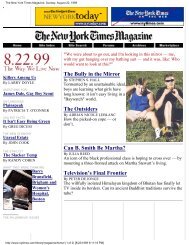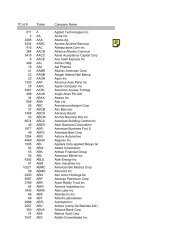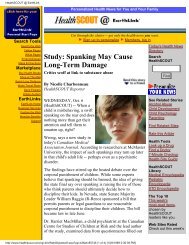The New York Times Magazine, Sunday, August 22, 1999
The New York Times Magazine, Sunday, August 22, 1999
The New York Times Magazine, Sunday, August 22, 1999
Create successful ePaper yourself
Turn your PDF publications into a flip-book with our unique Google optimized e-Paper software.
<strong>The</strong> Outsiders<br />
whole school."<br />
Neither does Andrew tell his parents. He believes they think he is popular. "If I<br />
try to explain it to my parents," he says, "they'll say: 'Oh, but you have plenty of<br />
friends.' Oh, I don't think so. <strong>The</strong>y don't really get it." His outcast friends,<br />
however, do.<br />
One of them is Randy Tuck, a<br />
5-foot-4-inch sophomore with a<br />
thick head of hair and cheeks bright<br />
red with acne. He rescued Andrew<br />
from a "swirly" (two boys had him<br />
ankle up, and headed for the toilet<br />
bowl).<br />
Randy moved from Alaska to <strong>New</strong><br />
Hampshire almost three years ago.<br />
To his frustration, his classmates<br />
called him Eskimo Boy. Art is his<br />
solace, along with the occasional<br />
cigarette. He loves to draw. He used<br />
to sketch Ninja Turtles and now,<br />
with the help of an art teacher, he's<br />
studying anatomy. He associates Randy Tuck (pictured at home) sought refuge<br />
among the freaks, who, he says, are "friendly, but<br />
with the freaks during school mainly<br />
not welcoming."<br />
because they let him. He says,<br />
"<strong>The</strong>y are friendly, but not welcoming."<br />
Classmates debate with Randy about his atheism, but he refuses to believe a God<br />
could arrange a life as unlucky as his. Andrew blames himself. Randy says,<br />
"Andrew's vulnerable and small and weak and R. takes advantage of that."<br />
Randy utilizes "verbal bashing" as a defense, although he admits that its powers<br />
don't prevent physical attack. R. surprised him one day in the hallway. He passed<br />
Randy, then turned around and punched him in the spine. But Randy also notes<br />
that R. can be funny. "When he's not in a bad mood, he can be very<br />
entertaining."<br />
Andrew says that the ostracizing "does build up inside. Sometimes you might get<br />
really mad at something that doesn't matter a lot, kinda like the last straw." He<br />
could understand the Columbine killers, Dylan Klebold and Eric Harris, if their<br />
misery had shown no signs of ending, but Andrew remains an optimist. After all,<br />
there are some people who have no friends. "Things are not going up really fast,<br />
but they are getting better," he says. "I might have a week where they get worse,<br />
http://www.nytimes.com/library/magazine/home/<strong>1999</strong>08<strong>22</strong>mag-boys-social-coping.html (5 of 13) [8/<strong>22</strong>/<strong>1999</strong> 9:18:<strong>22</strong> PM]






